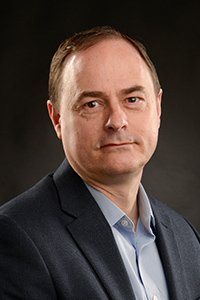Learning from Leaders at the TMMBA Tech @ the Top Speaker Series: Matthew Trunnell
The Tech @ the Top speaker series showcases successful leaders, executives, and entrepreneurs from a variety of organizations. Topics span leadership, entrepreneurship, globalization, social innovation and business growth strategies. An event brings students, alumni, and community members together to network and learn from the leadership philosophies and strategies that have transformed a speaker’s career, organization, and life.
As Senior Associate Director for the work-compatible Technology Management and Hybrid MBA Programs, I organized the Tech @ the Top series. The series is an important part of the MBA experience as it enhances the learning, reflection, and application of students’ studies. Here is my recap and impressions of our first speaker in the fall 2017 series, Matthew Trunnell.
~ Susie Buysse

Matthew Trunnell, CIO, VP of IT at Fred Hutchinson Cancer Research Center & Executive Director, Hutch Data Commonwealth
It was 5 p.m. on October 16, 2017. Students and alumni filled a three-tiered Eastside Executive Center classroom as Matthew Trunnell, CIO & VP of IT at Fred Hutchinson Cancer Research Center took the podium as the Tech @ Top Speaker. Matthew leads an enterprise IT organization of 90 members. He built and is the Executive Director of Hutch Data Commonwealth, a team focused on building new capabilities for powering data to advance science and cure cancer and related diseases in more patients. (The Hutch Data Commonwealth: changing the way we do science)
Matthew said, “It’s a tremendous time to be involved in data and biomedicine. The opportunity and challenge in science is that we have data coming from multiple sources at scales that we are unaccustomed to.” I was fascinated by Matthew’s description of structured data (e.g. electronic medical records, medical images, and prescriptions) and vast unstructured, non-traditional consumer data – such as credit card purchases, gym memberships, Facebook posts, tweets, and blogs – that may be available for a healthcare provider to better understand patients and inform decisions.
He added, “For example, The University of Washington health system has 4 million patients and about 400,000 or 10% are cancer patients. But in any given year or for any given type of cancer we may want to study, the numbers drop pretty low. There is some hint that maybe we can leverage this internet scale of data directly by leveraging alternate data sources. In the summer of 2015, Microsoft Research published a paper that demonstrated that by analyzing the history of search terms, they were able to conclusively identify pancreatic cancer before it had been diagnosed medically. This is a tremendously different way to think about what we do.”
The complex data integration is rapidly evolving and connects to three technology areas of focus for the Commonwealth: natural language processing to extract information from clinical records, the application of “deep learning” to medical image analysis, and the collection and analysis of data from mobile devices. The data revolution is creating new jobs that require different skills and competencies, such as UI/UX and data engineering,
With Fred Hutch’s promising mission to cure most cancers by 2025, Matthew shared how Fred Hutch is developing partnerships with regional technology and research organizations to drive data sharing and collaboration. Our group was interested to learn that Microsoft CEO Satya Nadella joined the Fred Hutch board in 2016. Geekwire recently described Fred Hutch’s growing partnership efforts that include Amazon and Microsoft.
